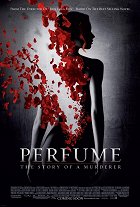Directed by:
Tom TykwerCinematography:
Frank GriebeCast:
Ben Whishaw, Alan Rickman, Rachel Hurd-Wood, Dustin Hoffman, Karoline Herfurth, David Calder, Simon Chandler, Sian Thomas, Jessica Schwarz, Corinna Harfouch (more)VOD (3)
Plots(1)
Based on the bestselling novel, "Perfume" is a story of an obsession so overwhelming that it leads to murder. In18th-century France lived Jean-Baptiste Grenouille (Ben Whishaw), who was born with a phenomenal sense of smell. But as his gift becomes an obsession, he strives to create the most intoxicating perfume in the world by murdering young women to capture their essence. (official distributor synopsis)
(more)Videos (1)
Reviews (12)
Tom Tykwer was not intimidated by the task of making a feature film with an idea, and the script of Perfume: The Story of a Murderer was not afraid of the attractive genre lure of a thriller. If you go watch this film and expect to see a classic bloody story about a murderer, you will probably go home annoyed and semi-suffocated by the descriptive and accentuated visual uniqueness of Perfume. But if you go see Tykwer's work as a film that intoxicates your senses, engages your mind, and, yes, like a fragrant candy on top, sometimes stirs your adrenaline with a little action, then there is no way you will be disappointed. My expectations of the proclaimed attack on the new sense, and a sense hitherto unexplored by film were not high, and that is good. In order evoke olfactory sensations, Tykwer uses well-proven visual (detail and expressive color) and auditory (amplification of certain sensations) means. It works commendably, but after the protracted introduction, the director shifts to a more usual style of storytelling, which is not a bad thing, especially when he works quite well with proven means (for all examples, worth mentioning is the short description of a series of murders that is fast, yet impressive). I really liked the central idea of the frantic pursuit of an ideal, after whose materialization Jean-Baptiste learns that there is only one scent that cannot be obtained: the scent of experience itself. And so Perfume is carried by this universal metaphor of an artistic act, it is carried by excellent actors led by the demonic Ben Whishaw and the sympathetically relaxed Dustin Hoffman. I would not hesitate to call parts of the story about the killer captivating, but on the other hand, it also has unnecessary shots. But his gradation and main idea are excellent, as are its... scents? Let's call it atmosphere. [I never read Süskind's book, so I only evaluate the film as it affected me without intertext overlap.]
()
Tom Tykwer is very inventive and has a head full of ideas, which he throws at the viewer with an unprecedented force, and he managed to adapt “Perfume” to the movie screen as well as possible. If we add great actors and the truly beautiful visuals, the occasional plot gaps and excessive running time can be forgiven. A truly unique story, a truly unique film.
()
This couldn't have been filmed better! Tom Tykwer took Süskind's seemingly unfilmable story and retold it. Like the author, with his colorful descriptions, the director also uses visual finesse to convey a subliminal sensation that the film medium deprives us of, and which leads the viewer's senses into a state of their own dubious confusion. With this film, there is no point in arguing about the strong implausibility of logic, etc. For the first time since Run Lola Run, Tykwer proves that brilliant craftsmanship can say (almost) everything.
()
With Perfume: The Story of a Murderer, Tykwer has taken on one of the most difficult challenges, namely how to portray the sense of smell in an audiovisual way. Especially if that sense of smell drives the plot. And super-especially if the hero of the plot is a silent, ruthless psychopath who destroys young girls for his own fulfillment. And because he fails at this challenge, the film fails too, the entire time. And yet it fails with never-before-seen grandiosity. The ways of depicting the protagonist's abilities here only really work in the case of the vile smell, where the opening fish market, for example, visualizes the disgusting environment with quick cuts and zooms. But when he starts to break bread with the other side of the olfactory spectrum, the film runs into the problem that there aren't really that many universal scents, since everyone has a different idea of what is pleasing and beautiful, and so from the first act onwards we are downright inundated with all manner of flowers, petals, and accentuated colors like a commercial for scented candles. Then when the protagonist uses his sense of smell for a practical purpose, namely to stalk his victims, it comes across as a cool superhero ability again. The problems mentioned above, however, stem from the decision to conceive the novel as a monumental historical fresco, where the viewer can turn away from the unpleasant story and simply enjoy the period setting. Hence all the crowd scenes, the meticulously soiled buildings, the dozens of rotten extras, the hundreds of costumes, the panoramic shots, and the frequent changes of location. But for the plot itself to work, it would have to be perceived in a much more intimate, individual way. After all, we’re talking here about one man's efforts to achieve absolute perfection and beauty through extreme means. The monumental treatment may try to emphasize the universality of such a quest, but in my opinion this is impossible when the subject is a sense as distinctive as that of smell.
()
A film, where even the closing credits have their specific scent. A scent both intoxicatingly sweet and desperately bitter. The perfume is a masterful and above all complex work, in which Tykwer shocked me with his precision and, above all, rawness. It is rare for me to be hit by such a rough film that matches my taste, but here a pleasantly exceptional success was achieved. It is not difficult to succumb to the magic of the film, with such fascinating editing and perfect musical accompaniment, few can resist. Another key advantage is the main character, who, despite their perversity, is strangely believable and induces almost guilty sympathy.
()



Ads